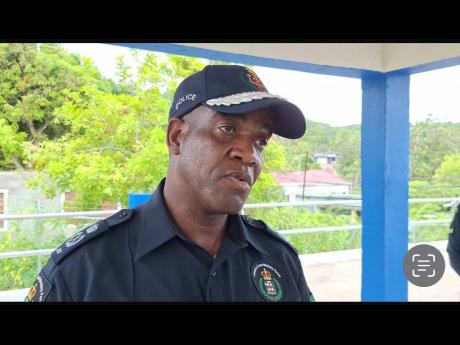Officers welcome the wearing of body cameras, says Commissioner Blake
WESTERN BUREAU:
POLICE COMMISSIONER Dr Kevin Blake says he is fully supportive of the wearing of body cameras by members of the Jamaica Constabulary Force (JCF), and added that, contrary to belief, the members of the force welcome its use.
“My officers welcome it (wearing of body-worn cameras) with open arms because they understand it,” said Blake, who toured several police stations in western Jamaica last Friay. “We have smart officers; a number of our officers are people who are highly educated, well trained, highly skilled, and so, this argument about the accountability that persons may be shying away from, let me dispel that and assure the members of public that that is not the case.”
Blake, who was elevated to the rank of police commissioner on March 19, is viewed as a part of the new face of the JCF, which is increasingly using technology as a crime-fighting tool. He has a first degree in computer science and mathematics, a master’s degree in computer-based management information system, and a PhD in sustainable development from The University of the West Indies.
According to Blake, who was accompanied on his tour by Assistant Commissioner of Police Glenford Miller, the officer in charge of Area One (Trelawny, St James, Hanover and Westmoreland), he sees no reason why an officer should be opposed to the using of body cameras.
“Our officers are fully aware that the same body-worn cameras, at times, stand a very good chance of exonerating them when there are certain allegations against them,” said Blake. “This idea that police don’t want to wear body-worn cameras because of whatever intention is nothing further from the truth, because, as I have always reminded my officers – and I have heard from the officers themselves – that if you don’t have a camera on, you may be the only one not recording an incident from your perspective.”
Blake, who is seeking to fully modernise the JCF, said he is cognisant of the fact that police officers sometimes make mistakes while carrying out their lawful duties, especially in hostile environments.
“People do make mistakes in their operations and that’s okay; it happens everywhere, it’s a very versatile environment, very hostile sometimes … sometimes incidents that my officers have split seconds to make a decision, but we get a year, two year, three years sometimes to analyse and say how it could have been done differently,” said Blake.
“Not to say we can’t learn from our mistakes, because that’s what fuels our training and our development. We learn as we go along,” added Blake.
According to him, the JCF has been quite busy over the last three years, working diligently to build out a technologically driven communication infrastructure to support new technology, such as the use of body-worn cameras.
“We have been building out that infrastructure, strengthening our infrastructure, our data centre, ensuring that our network communications are adequate, so that we can properly manage the products from these body worn cameras,” explained Blake. “Now that we have completed that, the next part of the project is to actually procure body- worn cameras and pin them on to our members.”
In noting that the body cameras would be useless without the infrastructure to support their use, the police commissioner said the public needs to understand that in getting the programme up and running in the proper way, the requisite infrastructure must be put in place.

